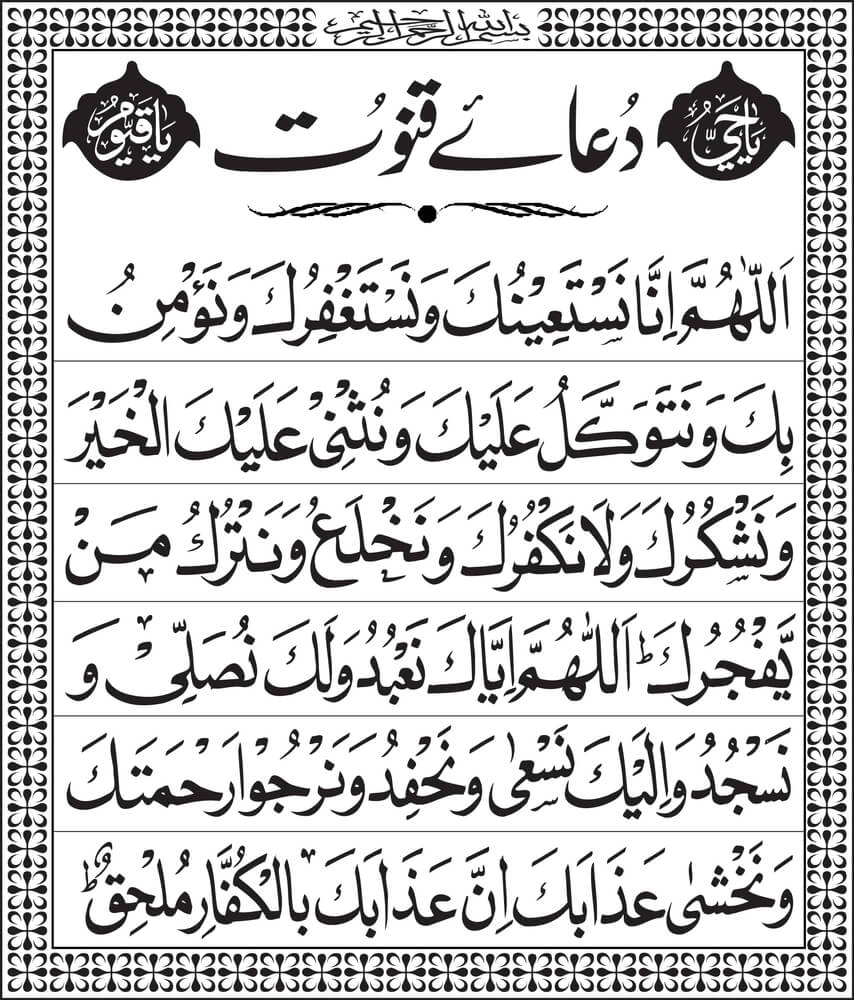Dua e Qunoot is not an everyday phrase, but for many Muslims, it becomes a regular part of their night prayers. It is especially read during the Witr Salah, which is the odd-numbered prayer performed after the Isha (night) prayer.
This supplication is a beautiful and powerful reminder of our dependence on Allah and our desire to stay on the right path. Also recite dua to make someone love you back.
In Islam, dua (supplication) is one of the most important ways to communicate with Allah. It is a direct link between a believer and their Creator. Through dua, Muslims ask Allah for guidance, mercy, forgiveness, and help in all matters of life. One very special and frequently recited dua is called Dua e Qunoot (دعاء القنوت). Also recite dua for love and relationship.
In this post, we will explore the meaning of Dua e Qunoot, its Arabic text, translation, when to recite it, its spiritual benefits, and tips for memorizing it, all based on simple, authentic Islamic sources.
What is Dua e Qunoot?
The word “Qunoot” comes from the Arabic word قُنُوْت, which means obedience, humility, and devotion. In Islamic practice, Dua e Qunoot is a special supplication made during Witr salah, which is part of the Isha (night) prayer.
It is called Qunoot because it is recited in a state of obedience and submission to Allah.
اللَّهُمَّ إِنَّا نَسْتَعِينُكَ، وَنَسْتَغْفِرُكَ، وَنُؤْمِنُ بِكَ، وَنَتَوَكَّلُ عَلَيْكَ، وَنُثْنِي عَلَيْكَ الْخَيْرَ، وَنَشْكُرُكَ، وَلَا نَكْفُرُكَ، وَنَخْلَعُ وَنَتْرُكُ مَنْ يَفْجُرُكَ.
اللَّهُمَّ إِيَّاكَ نَعْبُدُ، وَلَكَ نُصَلِّي، وَنَسْجُدُ، وَإِلَيْكَ نَسْعَى، وَنَحْفِدُ، وَنَرْجُو رَحْمَتَكَ، وَنَخْشَى عَذَابَكَ، إِنَّ عَذَابَكَ بِالْكُفَّارِ مُلْحَقٌ
Transliteration:
Allahumma inna nasta’eenuka, wa nastaghfiruka, wa nu’minu bika, wa natawakkalu ‘alayka, wa nuthnee ‘alaykal khayr, wa nashkuruka wa laa nakfuruka, wa nakhla’u wa natruku man yafjuruk.Allahumma iyyaka na’budu, wa laka nusalli, wa nasjudu, wa ilayka nas’aa, wa nahfidu, wa narju rahmataka, wa nakhshaa ‘adhaabaka, inna ‘adhaabaka bil-kuffaari mulhiq.
Translation:
O Allah, we seek Your help, we ask for Your forgiveness, we believe in You, we trust in You, we praise You with all goodness, we thank You, and we do not deny You. We separate and leave the one who disobeys you.O Allah, You alone we worship, for You we pray and prostrate, and to You we strive and hasten. We hope for Your mercy and fear Your punishment. Truly, your punishment will reach the disbelievers.
When and How to Recite Dua e Qunoot
Dua e Qunoot is usually recited in the third rak’ah of Witr prayer, after the ruku (bowing) position in the Hanafi school of thought. However, in some schools like the Shafi’i, it is recited before ruku.
Steps:
- In the third rak’ah of Witr, after rising from ruku, raise your hands.
- Recite Dua e Qunoot clearly and slowly.
- End the dua by saying Takbeer (Allahu Akbar) and go into sujood (prostration).
Spiritual and Personal Benefits of Dua e Qunoot
- Closeness to Allah – This dua reminds us that all power and help come from Allah.
- Strengthens Faith – It expresses belief, trust, and worship only of Allah.
- Protection from Harm – We seek Allah’s mercy and fear His punishment.
- Forgiveness – We ask Allah to forgive our sins.
- Guidance – It helps us stay away from those who disobey Allah.
Hadith References for Dua e Qunoot
1. From Sunan Abi Dawood (1425):
عَنِ الْحَسَنِ بْنِ عَلِيٍّ، قَالَ عَلَّمَنِي رَسُولُ اللَّهِ صلى الله عليه وسلم كَلِمَاتٍ أَقُولُهُنَّ فِي الْوِتْرِ
Transliteration:
‘Anil Hasan ibn Ali, qala: ‘Allamani Rasoolullah ﷺ kalimatin aqooluhunna fil witr.’
Translation:
Hasan ibn Ali (RA) said: “The Messenger of Allah ﷺ taught me some words to say in Witr prayer.”
This hadith confirms that the Prophet Muhammad ﷺ used to teach this dua for Witr prayer.
Reference from the Quran
Though Dua e Qunoot is not taken directly from the Quran, the concepts in the dua are fully supported by Quranic teachings: Also recite
Surah Al-Fatiha (1:5):
إِيَّاكَ نَعْبُدُ وَإِيَّاكَ نَسْتَعِينُ
Transliteration:
Iyyaka na’budu wa iyyaka nasta’een
Translation:
You alone we worship, and You alone we ask for help.
This matches the line in Dua e Qunoot:
اللَّهُمَّ إِيَّاكَ نَعْبُدُ – O Allah, You alone we worship
Tips to Memorize Dua e Qunoot Easily
- Start with small parts – Break the dua into small lines.
- Use audio recitation – Listen to trusted Quran apps or YouTube videos.
- Repeat daily in salah – Practice it in Witr every night.
- Use transliteration and translation – Helps in learning the meaning and pronunciation.
Conclusion
Dua e Qunoot is a powerful way to connect with Allah through worship, trust, and humility. It teaches us to seek His help, thank Him, and stay away from disobedience. Reciting it during Witr prayer brings peace to the heart and strengthens our faith. Even if you haven’t memorized it yet, you can start with small steps and build consistency. You can also use this dua as urgent help in difficult times. Understanding the meaning of this dua makes it more heartfelt and meaningful. May Allah accept our duas and keep us firm on His straight path. Ameen.
Common Questions
1. Is Dua e Qunoot wajib (compulsory)?
In the Hanafi school, it is wajib (necessary) in Witr prayer. If someone forgets, sajda sahw (prostration of forgetfulness) can be done.
2. Can we make other duas instead of Dua e Qunoot?
Yes, if you don’t remember the full dua, you can make any sincere dua, especially asking for forgiveness or help.
3. Can Dua e Qunoot be recited silently?
Yes. It can be recited silently in personal prayer, but in congregation, it is usually recited loudly by the imam.

